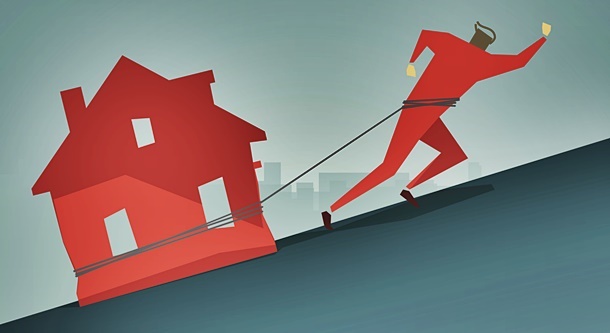Cape Town - Hard-pressed South Africans are so worried about losing their homes that they are turning to unsecured debt at increasing costs to service home loan payments.
South African consumers are R1.66trn in debt, according to the National Credit Regulator (NCR). The latest data also notes that a big amount of this debt is in the form of mortgages, vehicle repayments, clothing accounts as well as secured and unsecured credit facilities.
Although nationally home loan ‘non performing loans’ are at cyclical lows, DebtBusters CEO Ian Wason is of the view that this is due to about 30% of homeowners borrowing short-term unsecured debt to keep these artificially high.
READ: The real cost of buying a home
"For clients with home loans they have borrowed unsecured debt at increasing costs and interest rates over shorter and shorter terms in order to keep their vehicle and home loan payments up to date," he told Fin24.
"When our clients come to us they have surprisingly good credit scores. This is due to them ‘borrowing from Peter to pay Paul’ and hence keeping their debt repayments up to date, but they are borrowing more debt," Wason emphasised.
He cautioned that this financial burden is often passed down from parents to their children.
READ: Tips to keep up with your bond repayments
Wason urged bond-holders to get their debt under control.
"Draw a credit report, draw up a budget and work out if you can live on a budget, pay off your more expensive debt and keep up with your home loan repayments."
Those who cannot make this work should contact their bank and a debt counsellor to see what options they have, he recommended.
"If you are worried about making ends meet then contact your bank and a debt counsellor. It is always better to inform your bank that you are going to miss a payment prior to missing it. The more informed you keep them, generally the more they will try and help you find a solution," said Wason.
Neil Roets, CEO of Debt Rescue, told Fin24 his firm continues to see an increase in applications for debt review where there are home loans involved and where the home loan is frequently in arrears.
READ: SA’s shocking debt spiral: Some forced to pawn cars
"This is not unusual in the case of over-indebted consumers, as the home loan is in most cases the most expensive debt. Though consumers attempt to take care of their most expensive asset, it is frequently difficult when there are so many competing payment expectations," he explained.
Roets said the most important thing is to keep payments up to date.
"In the case of assets, credit providers are very strict on payment monitoring, as there is an asset involved that can be attached when there are no payments received. The probability of a loss is higher if they delay the attachment process."
Roets briefly outlined the steps involved in the repossession of a house.
- The process of repossession starts when the credit provider advises the defaulting consumer of the intent of legal action through the issuing of a Section 129 letter in terms of the National Credit Act.
- This letter advises the consumer to rectify the default, or alternatively seek help from a debt counsellor, failing which the credit provider will formally proceed with legal action.
- If the consumer does not heed this warning, the credit provider can then proceed by applying for a summons, and subsequently a judgment.
- Thereafter there will be an application for a warrant, which enables the credit provider to repossess and sell the asset.
READ: You have options - banks 'don't really want to repossess your home'
He strongly advised consumers to seek the help of a debt counsellor as soon as they receive the Section 129 letter, as a debt counsellor cannot assist on accounts where legal action has already been initiated, ie once the summons has been served.
Wason explained further that once legal action has started, a consumer will immediately be incurring legal costs and handed over to the bank's legal department, who will draw up a sale in execution document and make an application to court to repossess your home.
"This is not what the bank wants to do – they are a bank, not a property owning business, so they will try and give you every single option so that they don’t have to repossess your property. However, if you don’t pay, then this is what they are forced to do."
Read Fin24's top stories trending on Twitter: Fin24’s top stories



 Publications
Publications
 Partners
Partners










